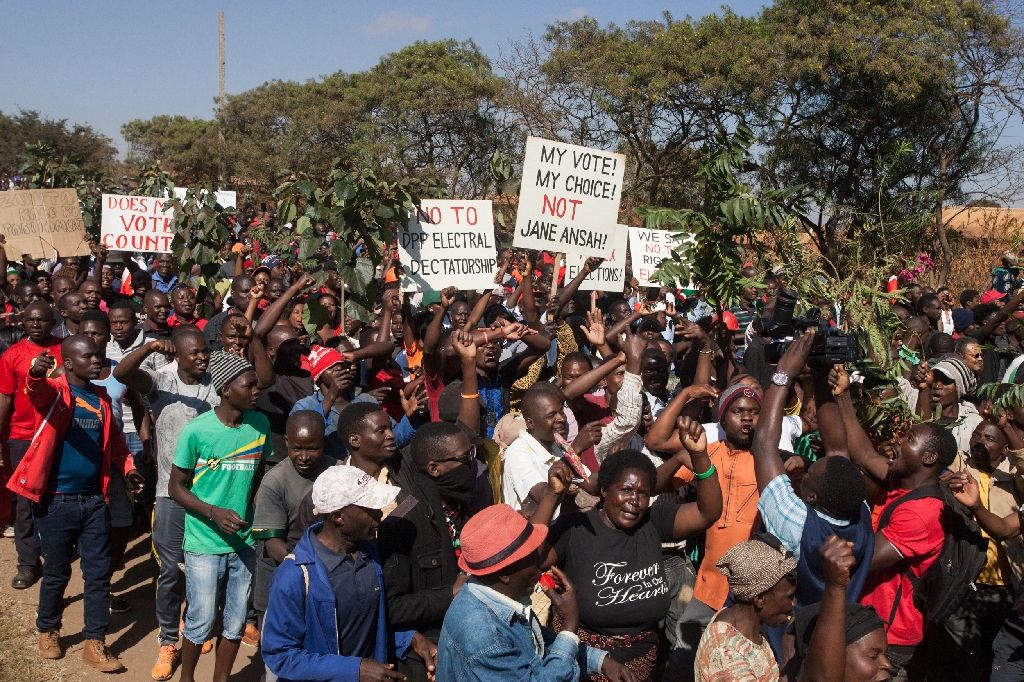Since the results of the 2019 general elections were announced on 27 May, Malawi has been in suspense. Two presidential contestants are challenging the outcome in court, while hundreds of thousands have taken to the streets demanding the resignation of Malawi’s leading electoral official.
According to the announced results, President Peter Mutharika of the Democratic Progressive Party (DPP) won a second term with 38.57%. Lazarus Chakwera of the Malawi Congress Party (MCP) came a close second with 35.41% and former vice-president Saulos Chilima of the UTM came third with 20.24%. Both of the defeated candidates, however, allege that the vote was marred by fraud and that results sheets were altered using typewriter correction fluid. Chakwera says the denial his rightful victory was “daylight robbery”. The case is being heard in the constitutional court in the capital Lilongwe.
At the same time, an alliance of local human rights organisations under the Human Rights Defender Coalition (HRDC) is calling for Jane Ansah, the chair of the Malawi Electoral Commission (MEC), to resign. The civil society groups allege that the elections were mismanaged and have organised a series of mass protests, some of which Chakwera and Chilima have attended.
These demonstrations have been well-attended in several cities such as Blantyre and Mzuzu, but they have been particularly vibrant in Lilongwe. This could be because the capital is Chakwera’s home and lies in an MCP stronghold, and that the HRDC leadership is based here.
So far, the HRDC has received official permission for its demonstrations. Despite a common misconception and past attempts by governments to stop protests by refusing to issue permits, this is not strictly necessary as demonstrating is a constitutional right in Malawi. Nonetheless, the HRDC has successfully sought legal authorisationfor their recent actions despite the efforts of the Attorney General.
Opponents of the protests have also tried to disrupt them in other ways. Ruling party cadres have attacked demonstrators on a number of occasions, while President Mutharika promised to crush the demonstrations in July. Earlier this week, the home of Timothy Mtambo, chair of the HRDC, was bombed.
The demonstrations have turned violent too at times with stores being looted and cars torched, particularly in Lilongwe and Mzuzu. The organisers regretted these actions but blamed people’s anger on authorities for trying to stop the protests. Some rioters also vandalised property belonging to ruling party politicians and engaged in opportunistic theft. The police have arrested over 100 people in connection with these crimes.
On past occasions, governments in Malawi have used the pretext of violence to prevent protests. However, even after the police publicly said they lack the capacity to manage the demonstrations, the courts insisted that people’s right to protest should be denied due to the incompetence of the authorities.
Where next for Malawi?
Malawi is in an uncertain and volatile situation, but there are positives to be drawn from the last few months. The fact that the judiciary has defended the constitution against the efforts of the ruling DPP bodes well for the country’s democracy. In doing so, the courts have displayed their independence and strength, while setting the record straight in asserting that citizens have the constitutional right to protest.
It is also promising to see how Malawians have turned out in huge numbers to express their frustrations and demand justice. Following demonstrations in 2011 in which over 20 people were killed, many people become afraid to take part in public marches. In fact, the recent protests are the first mass demonstrations since that fatal episode and the high turnout suggests many Malawians have overcome their fears.
This sends a strong message to authorities, not just now but in the future, that citizens will demand justice where they think it is lacking. The beneficiary of this is the country’s democracy. Democracies thrive on citizens’ participation on issues of public concern, which holds powers accountable and strengthens the mandate and credibility of a country’s leadership.
For now though, the protesters’ demands have not yet been heard and Ansah has refused to step down until the court issues its judgement. The demonstrators have therefore announced fresh protests from 26-30 August when they will occupy airports and shut down borders.
On Wednesday, President Mutharika spoke about the protests for the first time since saying he would crush them in July. He publicly ordered the Malawi Defence Force and police service to use “all the necessary force to ensure that the integrity of our borders is not compromised even for a single minute”.
“Invading borders is the greatest threat anyone can pose to our country,” he said. “I will therefore have no choice but to take all measures necessary to ensure and protect the sovereignty and integrity of our nation.”
Malawians, many of whom now argue openly about politics and are gripped to their radios for news, are currently highly polarised between sympathisers of the ruling and supporters of the opposition. This means that however the court rules and what unfolds next week, one side is unlikely to accept the outcome quietly. After this, the strength of Malawi’s institutions and democracy may be tested even further.



